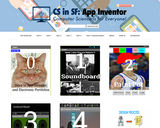
AppInventor
- Subject:
- Computer Science
- Science
- Material Type:
- Full Course
- Provider:
- San Francisco Unified School District
- Date Added:
- 05/02/2019

AppInventor
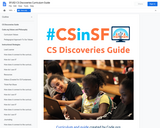
CS Discoveries is an introductory computer science course that empowers students to create authentic artifacts and engage with computer science as a medium for creativity, communication, problem solving, and fun.
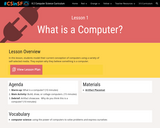
In this lesson, students model their current conception of computers using a variety of self-selected media. They explain why they believe something is a computer.
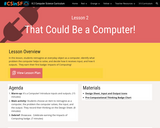
In this lesson, students reimagine an everyday object as a computer, identify what problem the computer helps to solve, and decide how it receives input, and how it outputs. They earn their first badge: Impacts of Computing!
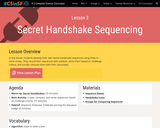
In this lesson, students develop their own secret handshake sequences using three or more moves. They record their sequences with symbols, revise them based on challenge criteria, and socially compare them with their classmates.
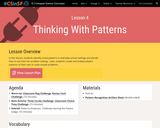
In this lesson, students identify visual patterns in everyday school settings and decide how to use them for problem solving. Later, students create and analyze playful patterns of their own to solve simple problems.
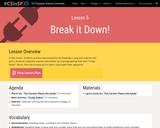
In this lesson, students practice decomposition by breaking a song and a dance into parts. Students creatively express themselves by choreographing their own "Funky Robot" dance, then decomposing it to teach classmates their sequence.
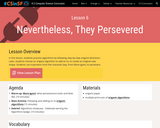
In this lesson, students practice algorithms by following step-by-step origami directions. Later, students choose an origami algorithm to add-on to, to create an original new shape. Students use inspiration from the character Joey, from More-igami, to persevere.
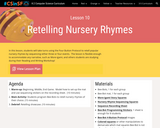
In this lesson, students will take turns using the Four Button Protocol to retell popular nursery rhymes by sequencing either three or four events. The lesson is flexible enough to accommodate any narrative, such as More-igami, and others students are studying during their Reading and Writing Workshop!
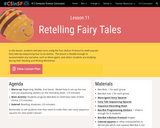
In this lesson, students will take turns using the Four Button Protocol to retell popular fairy tales by sequencing four to six events. The lesson is flexible enough to accommodate any narrative, such as More-igami, and others students are studying during their Reading and Writing Workshop!
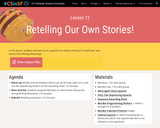
In this lesson, students will take turns using the Four Button Protocol to retell their own stories from Writing Workshop!
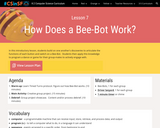
In this introductory lesson, students build on one another's discoveries to articulate the functions of each button and switch on a Bee-Bot. Students then apply this knowledge to program a dance or game for their group-mates to actively engage with.
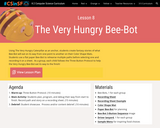
Using The Very Hungry Caterpillar as an anchor, students create fantasy stories of what Bee-Bot will eat on its way from one point to another on their Color Shape Mats. Students use a flat paper Bee-Bot to rehearse multiple paths before selecting one and recording it on a sheet. As a group, each child follows the Three Button Protocol to help the Very Hungry Bee-Bot eat its way to the finish!
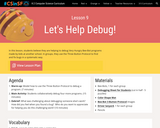
In this lesson, students believe they are helping to debug Very Hungry Bee-Bot programs made by kids at another school. In groups, they use the Three Button Protocol to find and fix bugs in a systematic way.
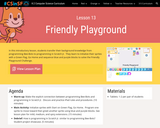
In this introductory lesson, students transfer their background knowledge from programming Bee-Bots to programming in Scratch Jr. They learn to initialize their sprites with a Green Flag, Go Home and sequence blue and purple blocks to solve the Friendly Playground Challenge.
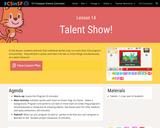
In this lesson, students discover that individual sprites may run more than one program concurrently. They will pick a sprite, and have it do two or more things simultaneously as a talent show act.
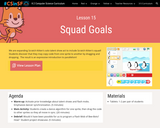
We are expanding Scratch Kitten's solo talent show act to include Scratch Kitten's squad! Students discover that they may copy code from one sprite to another by dragging and dropping. The result is an expressive introduction to parallelism!
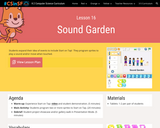
Students expand their idea of events to include Start on Tap! They program sprites to play a sound and/or move when touched.
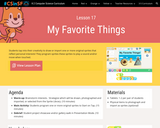
Students tap into their creativity to draw or import one or more original sprites that reflect personal interests! They program sprites these sprites to play a sound and/or move when touched.
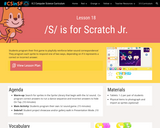
Students program their first game to playfully reinforce letter-sound correspondence! They program each sprite to respond one of two ways, depending on if it represents a correct or incorrect answer.